Upgrading home water heating provides a great opportunity for homeowners to cut utility bills and environmental impact through efficient new systems like heat pump water heaters. These innovative appliances leverage ambient warmth instead of fossil fuel-powered elements to heat water over 50% more efficiently and sustainably. As heat pump water heater technology rapidly improves, many homeowners stand to benefit from cheaper, eco-friendly hot water.
However, finding the best water heating solution still requires careful consideration of individual home conditions before rushing into upgrades. Thoughtfully weighing factors like existing utility rates, installation layouts, regional climates, and maintenance needs against the latest heat pump water heater features and benefits ensures homeowners simplify the decision-making process. Taking a solutions-focused approach helps homeowners cut costs while benefiting the planet from smarter water heating upgrades.
How Heat Pump Water Heaters Work
Heat pump water heaters utilize constant renewable ambient air or underground geothermal warmth rather than expensive, environmentally harmful electricity to heat water, making them extremely efficient appliances. An internal compressor automatically shifts existing free environmental thermal energy from the outdoors or subfloor indoors through conduction principles – similar to how refrigerators cool food yet operate in complete reverse.
This leverages abundant, sustainable external heat at no cost rather than burning fossil fuels to generate unnecessary new heat strictly for water warming purposes wastefully. It’s ingenious physics sustaining precious resources.
Economic & Environmental Savings
Heat pump water heaters cut utility bills by over 50% compared to conventional pure electric heaters by using free ambient warmth. Reduced power demands also decrease one’s carbon footprint from lower fossil fuel-derived electricity needs. Although initial purchase prices exceed standard water heaters, long-term energy savings offset higher upfront costs over time.
Installation Factors to Consider
Cold climates diminish heat pump water heater efficiencies, making them less ideal for frigid northern homes. Additionally, the surrounding space must allow unrestricted airflow around the unit without cramping other systems. Homeowners must also confirm that a sufficient installation area exists before selecting these often larger water heating systems.
Ongoing Maintenance Needs
While infrequent, heat pump water heaters require regular maintenance, like cleaning filters and confirming optimal performance through professional check-ups. But when maintained properly, these systems enjoy longer lifespans than conventional alternatives, further magnifying long-term cost benefits.
Conclusion
Evolving to more sustainable systems like heat pump water heaters allows homeowners to innovate for economic and ecological gain. But realizing true efficiency relies first on asking the right questions to determine ideal home compatibility beyond surface merits. Taking time to understand how upgraded models align with current household conditions indeed provides clarityx when navigating change.
Carefully weigh existing utility costs against heat pump water heater savings forecasts based on your rates. Evaluate installation spacing needs to prevent future problems. Consider if regional climates impact potential efficiency gains before proceeding. Always ensure that you budget for ongoing maintenance requirements when considering an upgrade, as this is crucial for maximizing the lifespan of your new system and enhancing the overall value of your home.

